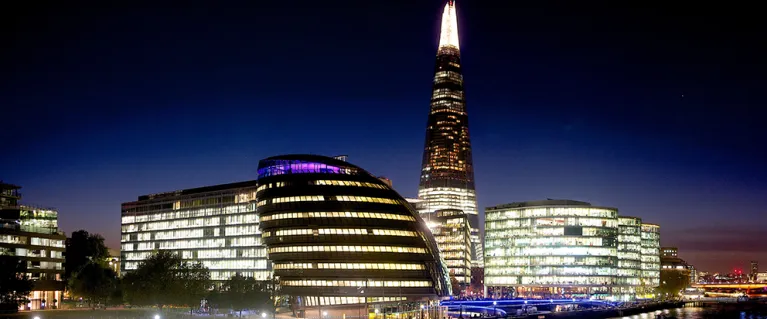
Smart energy
The Mayor wants to make London’s energy cleaner, fairer and smarter while making homes and workplaces warmer, healthier and more affordable. Generating energy from more renewable sources like solar will help cut London’s carbon emissions - but we also need to use energy in smarter ways.
Smarter energy for London is:
- optimising supply and use of energy
- increasing use of distributed energy resources (DERs), such as: local generation, storage, demand side flexibility, electric vehicles (vehicle-to-grid) or peer-to-peer local energy trading.
- using data and technology (including DERs) together to cut costs and bills, reduce and better manage energy demand and minimise emissions.
- staying ahead of the technology curve with new city-wide collaboration between public institutions, utilities, our world-class creative industries, scientific research and tech communities.
Smart energy will play a significant role in helping the Mayor achieve his ambitions for London’s energy. It’s also a key approach for delivering his ambition to make London the world’s leading ‘Smart City’.
Technology and innovation
The energy system is rapidly transforming with the increase in distributed energy resources (DERs), data and innovative technologies being used, such as electric vehicles, battery storage and flexibility services. According to the Future of Smart, smart energy systems have an economic potential of £1.5 billion for London by 2020.
The ‘business as usual’ energy market is no longer viable or sustainable. Consumers can now create, store or sell their own power directly to the grid. Vehicles can take electricity from the grid when demand is low and return it when demand is high. They could help to even out peaks and troughs and make the grid more efficient, resilient and smarter.
Smart technologies can minimise energy consumption and emissions, maximise the use of renewables and supply energy to consumers at the lowest cost. ‘Advanced process control’ can predict demand and control energy systems to meet specific objectives such as to avoid energy peaks.
Installing more smart meters will help consumers better understand their energy usage and allow the market to develop ways to help them reduce their energy bills and use less energy.
Over time a smart and flexible energy system could reduce London’s peak demand by one gigawatt, the equivalent power of 100 million LED bulbs. Smart energy could create nationwide financial savings of £8 billion per annum by 2030 (National Infrastructure Commission). Such significant savings could and should be passed on to the consumer.
The Mayor's smart energy programme
The energy market transforming to a smarter system creates an ideal opportunity for London to be at the forefront of this transition into a smarter energy future.
The Mayor’s programme will address the following areas:
1. Leadership, engagement, bringing stakeholders together to ensure smart energy opportunities and Energy for Londoners objectives are realised, collaborating to deliver strategies, programmes and projects.
2. Action plan for rolling out smart energy innovations to reduce energy demand, cut bills and provide flexibility by using the Mayor’s policies, programmes and Greater London Authority group to promote and accelerate innovations - including smart energy meters, energy efficiency and electric vehicles.
3. Enable distributed energy resources to be used by London’s homes and workplaces, allowing them to participate and benefit from demand side electricity markets. Support suppliers to offer new and better energy resources and services, creating good jobs and new value for London's businesses and the electricity system.
4. Demonstrating smart, integrated energy systems across energy supply, storage and use. Join up power, heating and transport to increase efficiency, value and flexibility - use clean energy cost-effectively and cut bills while creating good jobs for the future.